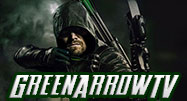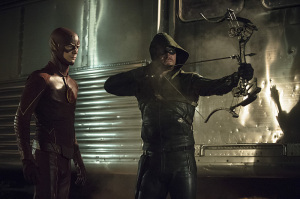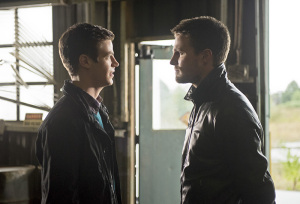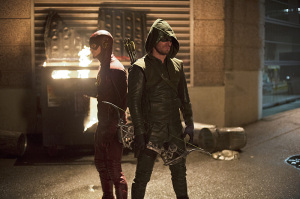

Arrow #3.8: “The Brave and the Bold” Recap & Review
Recaps & Reviews December 9, 2014 Matt Tucker

Summary: An engaging finale to the crossover that finally gives us a solid in on Oliver’s arc for the season.
If you have not seen this episode yet and do not wish to be spoiled, do not continue reading!
Recap
Turning up little in Central City, Oliver, Roy, and Diggle track their boomerang assassin down to a house in Starling. He’s not there but they are confronted by an A.R.G.U.S. squad looking for him as well, confirming that he was an A.R.G.U.S. agent. Diggle talks with Lyla at A.R.G.U.S. to find out more about the guy when he attacks. Oliver and Roy show up to fight him off, and just when the man is about to take Oliver down with boomerangs, Barry Allen races in as the Flash to save him. The group takes Lyla to the Arrowcave for protection, and she reveals that the man is Digger Harkness, former member of Task Force X, the so-called Suicide Squad. On a mission that went wrong, Lyla gave the order to terminate the operatives by their killswitch. Harkness survived and wants revenge.
Using Cisco’s knowledge, they’re able to trace the boomerang to an arms maker working with the Bratva. Oliver reluctantly agrees to Barry’s help and the Flash makes quick work of tying up the Bratva thugs. Oliver finds the arms maker and tortures him into giving them a phone with information about Harkness, much to Barry’s horror. Oliver tells him that Starling City is far different from Central City and that more extreme measures are necessary. Barry insists that Oliver’s hellish life shouldn’t be an excuse to inflict that pain on others but should be the reason why he doesn’t and should be better.
After they scope out another lead which takes them to another group of thugs and a second phone, they realize that Harkness tricked them. Remotely activated the first phone, Harkness is able to track it to the foundry. He attacks Felicity, Caitlin, and Lyla, gravely injuring Lyla. Caitlin and Felicity are able to stabilize her while the others arrive. Barry is able to quickly whisk her to a hospital. Oliver blames himself for the error in using torture to fall right into Harkness’ plan. He explains that he loses pieces of his humanity every time, but Barry gets him to accept that his humanity is what got him through so many trials and allows him to be the hero he is.
They track Harkness down a final time to a train station. Arrow and the Flash arrive to take him on, and Harkness reveals that he’s planted five bombs around the city to go off in 90 seconds. Flash races to take care of the bombs but finds that they all have to be shut off at the same time or risk setting them all off. Thinking it through, he speeds Felicity, Caitlin, Cisco, and Roy to other bombs and they all stop them at the same time. Oliver captures Harkness, who tries to play with Oliver’s emotions by telling him he’s nothing if he won’t do what’s necessary to torture or end him. Oliver insists he doesn’t have to.
Harkness is taken to the Lian Yu prison, and the S.T.A.R. Labs crew and Team Arrow meet up in the foundry to say goodbye. Oliver had Felicity install a case for Barry’s outfit for any time he’s in Starling. Cisco redesigned Oliver’s jacket to make it more efficient and offers to make further designs. As everyone goes to leave, Barry and Oliver state they have unfinished business. Meeting up in an abandoned warehouse, they spar with each other to determine just who would top who.
In the past, Waller compels Oliver to secure the location of a bomb in Hong Kong by torturing it out of a guy. He tries to push himself to do it, but his hesitation results in the bomb going off. Waller chastises Oliver, but let’s him know he has the moral ambivalence suited for the job. She gives him a second chance, an opportunity to interrogate the guy connected to China White for information about her.
Review
“The Bolt versus the Bow.”
That’s the tagline and media hype used to market the two-night event between Arrow and its fledgling sister show The Flash. It’s the kind of announcement that would easily find a home in a starburst splash on the cover of a comic book, adorned with any multitude of exclamation points.
The title page inside would likely spell out the parameters, something both hours do well with the Diggle-Cisco hero-off in The Flash episode, meant to mirror ages-old debate geekery, and the cheshire-smile-to-your-face, Rocky III-esque closure to Arrow‘s hour.
It’s during that final friendly that Oliver spells it out clearly: “Speed against experience and strategy.” While that can certainly speak to the actual confrontations of our heroes in the two episodes, as well as the clash of their differing approaches in meting out justice, it very slyly represents both shows themselves.
Since its debut as the most watched premiere in the history of the CW network, The Flash has dazzled each week with a sense of fun, humor, and heavy superheroics befitting its incorporation of powers and supernatural abilities. The texture of the show reflects the wonder and enthusiasm that Grant Gustin imparts in Barry Allen. Even with some darker material peeking around the corners at times, particularly in the nefarious dealings of one Dr. Harrison Wells, there’s a sense of optimism and outright joy inherent in the show that makes it float. Not to get too thick on the Flash metaphors, but the show is so zippy in its approach and feel that it’s not hard to see why it consistent remains the network’s best watched show this season.
By contrast, the more ominous and convoluted world of Arrow is very reflective of its central figure, Oliver Queen. It can have its fun and light, as well, but it’s far more strict, grounded, and deadly. As the elder statesman between the two series, there’s also an experience in storytelling that proves a boon to the show. While The Flash certainly isn’t lacking in stakes and emotion, there’s a decided heft to Arrow that serves to make stories more impactful. We had fun in Central City in the first hour, but the second stands as the stronger of the event.
It also speaks to a point brought up in review of The Flash‘s episode that, aside from a couple of threads, the only thing that really constitutes an “event” here is that casts from each show spent time on the other. Both stories work individually, but the event would’ve felt more effective if it had featured a single story that stretched across both series. Digger Harkness and his campaign could easily have done that.
One of the things that has always had my preference between the Big Two comic companies lean more toward Marvel has been the “colorfulness,” as it is sometimes referred to, of the DC Universe. This isn’t said to start the unwinnable debate between which company is better, and Marvel certainly has its fair share of oddities and cringeworthy camp, but DC has often felt too silly to me. The primary difference between the philosophies of the two was that the Marvel way was focusing on human foibles amidst science fiction and extraordinary circumstances, while DC was decidedly archetypal and mythological. (Those are broad strokes, and things have certainly been far more grey than black and white for both companies over the last 4 decades.) DC’s approach allowed and encouraged them to embrace the silly and outlandish, and their pantheon of characters expresses that.
Though renowned up there with Batman’s and Spider-Man’s collections of baddies, I’ve generally never warmed to Flash’s rogues gallery because they were often the silliest. Comics writer and DC Entertainment creative guru Geoff Johns has made a career of redefining these guys into complex, tortured characters as much as formidable foes, and that work is a key template behind this show’s “Arrow-fication” of characters to make them more palatable and believable in live-action. A new front-running candidate for best adaptation comes in the spare but enthralling Harkness, he who would be the clownish Captain Boomerang, one of the Flash’s chief enemies.
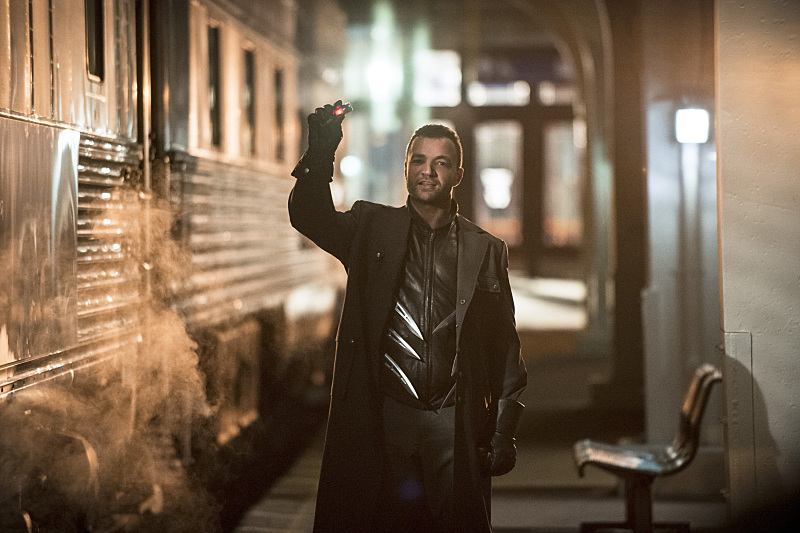
The show continues its overwhelming success of funneling former Spartacus cast members into villain roles. Nick Tarabay was an early fave of that series, and he positively shines here. Sure, the dialogue was a little punchy with obvious boomerang references, and his final bomb gambit was a bit too convenient given the Scarlet Speedster’s role in the proceedings, but at no point did he ever feel like he wasn’t a serious threat. Perhaps we’ve just been so acclimated by depictions of Batarangs over the years, but even the use of his preferred weapons came off as legitimate and vicious, a feat with such a high degree of potential difficulty.
All the while, there’s Tarabay giving a convicted performance with enough flair that you overlook the rather thin arc for him in the episode and look forward to when we’ll see him again. That’s another sly treat of this episode. For how big a role Harkness could conceivably play in Barry Allen’s future, it seems a bit strange that the two are introduced to one another over here in Starling City. (Great first contact moment with Barry zooming in to block the boomerangs from hitting Oliver and Harkness getting his first eyeful of the Fastest Man Alive.) Yet, there’s a lot of sense to presenting him this way. Harkness isn’t one of the dark matter freaks of the week created by the particle accelerator accident at S.T.A.R. Labs. He’s a regular Aussie with a particular skillset, who happened to be a member of the Suicide Squad at one point. That grounded approach fits Arrow‘s place in this universe, and his introduction here serves to give his threat more deadly import.
That threat also elevates the hour over its predecessor because the stakes feel more personal. We all know that Lyla Michaels can handle herself, and her work with A.R.G.U.S. and Task Force X has exposed her to quite a number of dangers in the past. Yet, we’ve gotten to see the other side, her softer side, in the birth of her daughter and relationship with Diggle. It’s precisely that connection to Diggle that pushes how personal a threat this is for the audience. We love John and, by extension, Lyla because of how well they work together as a partnership. Full credit goes to David Ramsey and Audrey Marie Anderson for filling in the gaps of such a strong and enjoyable bond in the relatively few scenes we’ve actually had with the two together. It’s attached us to Lyla; she might not be Team Arrow but she is family.
By all means, this is Lyla’s work and choices coming back to bite her in the ass; she’s not an innocent in the situation. It’s even quite interesting that, after she sided with Oliver and John to force Amanda Waller to call off the drones during Slade Wilson’s attack on the city, they give her and Oliver this shared beat with each other over Waller’s philosophical outlook on the world. Both express hatred of her methods and yet they each seem to hold fast to that viewpoint that sometimes the dirty choice needs to be made to deal with the kind of threats that exist out there. While Harkness’ arc might be thin, his motivation certainly isn’t. That’s no justification, but surviving an attempted assassination by your employer might set you on a path of revenge, as well.
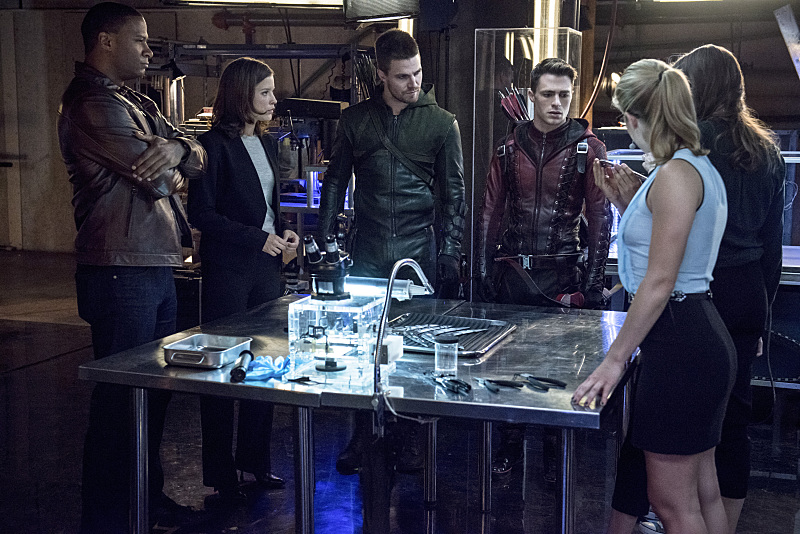
Lyla as the catalyst for the episode also provides another crucial benefit, not just to the episode but to the season: By associating A.R.G.U.S., and therefore Waller, for the first time all year, the flashbacks feel directly relevant. It’s long baffled why Waller would’ve chosen this welp Oliver Queen to aid in her Hong Kong activities, to take the time to train him, and just what his ultimate mission will be. Sure, he learned some skills in his two tumultuous years on the island, but he’s hardly capable enough to be an A.R.G.U.S. agent. Yet, it’s clear she observed in his time on the island that he’s got a definite moral flexibility that could serve her well. That’s the crux of the past timeline, so far, in how it relates to this season’s overarching theme.
With the structure of the story The Flash is telling at this point, it’s a bit hard to see the event’s first hour as diversionary. Solving the murder of Barry’s mom is the clear main story arc on the season, but it’s been largely a series of individual adventures each week up to this point. What’s yet another? On the other end, going in, this event seemed quite tangential to the main story arcs of Arrow‘s season 3. Surprisingly, it has quite a bit more effect on the season than some other recent episodes. The theme of identity and Oliver Queen vs. Arrow gets its best treatment here with Barry implanting the idea in Oliver’s head that he can actually do public things to help and inspire the city as Oliver Queen. Ray Palmer has been a perfect example of that.
As of late, Oliver has been a rather big a-hole, quite frankly. At first glance, it appeared to be heightened purely for this two-night event. He reluctantly offered to help Barry in Central City at Felicity’s insistence, and when he did, he chose that time-honored tradition of being the gruff mentor looking down his nose at the whimsical antics of his charge. Then, Barry and the Labs crew (the Labradors? The Labrats? We need something better than Team Flash.) show up in Starling to help and Oliver treats it like he just got thrown out of his room so that his visiting cousin has a bed for the week during Christmas family time. It seemed like huge regression for the character all for the sake of setting up the different sides of the conflict between he and Barry.
It’s more than that, though. His dogged pursuit of tracking Thea down, his unilateral decision to effectively bench Diggle at the start of the season, his denial to aid Laurel in her pursuits, and his seething jealousy and inactivity regarding his romantic feelings for Felicity. Everyone is moving on to different things in their lives, not abandoning their joint cause, but actually taking part in the lives they are protecting, and rightly or wrongly, Oliver feels like he can’t do that. This hour, he chalks that up to losing his humanity, something reinforced by the flashbacks with Waller learning how to torture, as well as the castigation of his methods by Joe West, Harrison Wells, and Barry. It’s an old trope that has been covered numerous times on the show and led to a very shaky understanding of just what this theme of identity was really supposed to mean on the season.
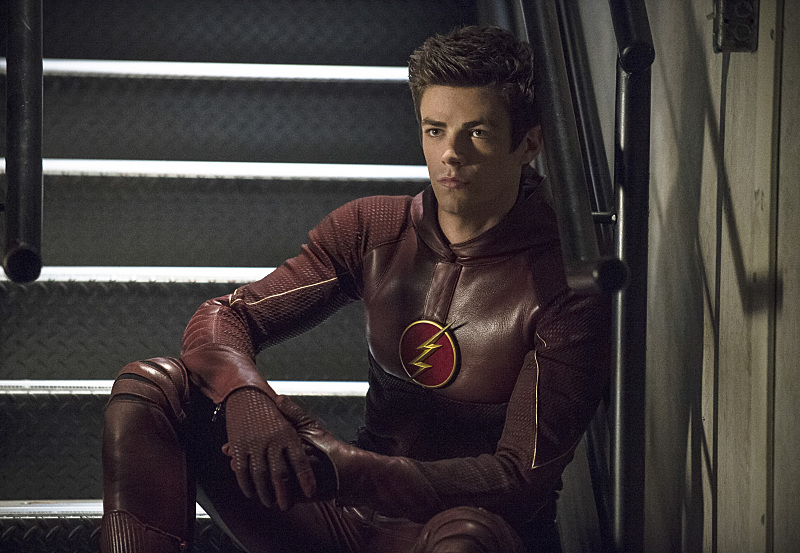
Barry simplified that for him, and for us. It’s not a struggle of losing humanity to this beast he’s created — “That guy’s a douche.” — though that’s clearly part of it. Rather, it really is about the balance of what one does outside of ourselves in life, be it through work or through our interactions with others, and what we are and need as an individual. This is frequently referred to in rudimentary terms in corporate culture as the “work/life balance.” It’s heightened given the unique nature of Oliver and his alter-ego, but it’s a far more relatable concept than originally perceived. Even Oliver seems to have a bit more understanding of his struggle.
That’s the true success of both of these hours of television. Beyond the cool factor of seeing our heroes team up, as well as slug it out for real and for bragging rights, both men are changed by the experience. They both learned something about themselves that can alter their course. There’s a lot of season left, and a lot more show left in both series, to see how that plays out. But those facts alone make the endeavor worthwhile.
For this viewer, Arrow‘s side proved the better of two enjoyable episodes because that experience in storytelling rooted the stakes and conflicts between characters in personal, human ways. What’s more is it demonstrated that both shows, with their disparate dispositions, can co-exist in a cohesive world and feel enriched by the shared interaction. Clearly, the ratings were enriched, as the series logged its best viewed episode to date. In a way, though there was assuredly shared audience between the two shows prior, some of the structure of the event was meant to sample each show for audience members who hadn’t given the other series a spin. It also served as a great jumping on point for new eyes across the board, and hopefully both continue to enjoy viewership they deserve.
Odds & Ends
- Giving Cisco and Caitlin a taste of just how serious this hero business can be was a good reality check for them. The Flash isn’t going to suddenly turn as serious as its archery-inspired kin, but fully driving home that idea will allow them to grow and progress as characters.
- Speaking of Cisco, great speech between he, Roy, and Diggle inside the van. Summed up well the approach and consequence to introducing super powers to this world.
- The constant mention of the fact that Diggle and Lyla weren’t married fell a bit flat as humor, and all but guaranteed the proposal late in the episode. Still, that moment between them was a charming one. Though, technically, the only couple on the series at the moment, they’re still the best one.
- I’m sure I’ve seen them in his gear before, but Arsenal using the escrima sticks during the fight with Harkness at A.R.G.U.S. added a nice, distinguish flavor to it.
- The opening sequence where Arrow, Arsenal, and Diggle raid Harkness’ house was a boots-on-the-ground way to re-establish the distinctive feel of the show after the first hour of the event.
- So many choice bits of dialogue throughout…
- “Is that your ‘we have it handled’ alarm?”
- “It’ll be over by the time they get there.”
- “At least every Wednesday.”
- “A league of their own.” (Wink, wink, nudge, nudge, DCMU.)
- “Sorry, Barry, I’m not as emotional healthy as you.”
- And, of course, namechecking the “Brave” and the “Bold” in Oliver and Lyla’s little interaction.
- Interesting that the put Harkness in the Lian Yu prison. Have to wonder, as they were both former ASIS, if Harkness and Slade ran into each other at some point in the past. Also, will the two of them being in their together provide an opportunity for both to escape?
- Harkness’ Captain Boomerang outfit was clearly patterned after the second Captain Boomerang, Harkness’ son Owen Mercer. It worked splendidly.
A SECOND OPINION
by Derek B. Gayle
The Flash is still in its infant stages, so having Team Arrow shift the perspective of any of those characters in the first part of its crossover was, well, pretty easy. That’s not to say there wasn’t any effort put into “Flash vs. Arrow,” which we of course raved about. But Arrow had a bit more of a challenge from the get-go if it wanted its title character to learn anything new in its part of the event. After all, we’ve already had two and a half years of Oliver growing from a ruthless vigilante to killer to a full-blown hero, albeit one with some issues.
So “The Brave and the Bold” targets a very specific aspect of Oliver’s heroism, torture, which is a detail so common in the show that it barely even registers for most of us. Barry and his team are new to it all, and those fresh eyes—especially ones not privy to the horrors of Starling City even before the Arrow arrived—expose the grit that Team Arrow has grown accustomed to. But the episode smartly doesn’t turn this into a criticism of Arrow, and instead uses it to highlight why Oliver and his methods are still important. Including Lyla and references to the Suicide Squad present a stern case for the ones who must be “bold,” making the tough choices in the worst of situations. They aren’t built for situations like the ones The Flash faces, and The Flash isn’t built for the situations the Arrow and ARGUS face. That dichotomy is what makes Arrow and The Flash such profoundly different shows, even with a universe so heavily interlinked.
Again, since Oliver’s hero’s journey has already been so implanted into the show, his growth is supplemented by a few other things “Flash vs. Arrow” didn’t quite need to tackle. In particular, Caitlin and Cisco get a rude awakening, in a very self-aware deconstruction of The Flash’s own lightness. That show is so silly and weird sometimes that it feels pulled right out of a comic book far more than Arrow does, and is farther than our own reality as a result. Much fun as that is, it makes it harder to reach the level of emotional stakes Arrow manages all the time, and Caitlin and Cisco now grasp how detached they’ve been. While their show will surely never get as dark as Arrow, they’ll surely start facing some darker threats as the show progresses, and this realization may be pivotal in accepting things as they get more complicated.
Cisco is frankly better used in this episode than he has been in the whole of The Flash, as he’s a great cipher to show how cool the Arrowcave—coined in a hilarious running gag—actually is. That’s the other thing this episode nails that “Flash vs. Arrow” didn’t need to: letting Team Arrow know they can have a little fun. Team Arrow didn’t really darken the place when they went to Central City, but Team Flash certainly lightened up Starling, and brought with it tons of meta humor, references, and gags that make this episode heavy in the fanservice. Sometimes that fanservice can border on self-indulgent, but unlike some of The Flash’s clunkier attempts in past episodes, this big crossover event is the perfect place to pack on the cheeky gags. It makes everything feel bigger and more celebratory, even as the characters themselves are mostly going through the motions.
All this is wrapped in a fantastic villain adaptation in Captain Boomerang, an amalgam of the sillier villains of The Flash and the brutal violence of Arrow. The boomerangs are funny to think about, but they’re extremely well-rendered on-screen, with Arrow’s typical well-choreographed fight sequences showcasing his ferocity. He’s bad enough to be locked away with the likes of Slade Wilson, after all, and that makes him a formidable nemesis for the conclusion of the crossover.
And like any good crossover, the two heroes are just fun to see work together. While “Flash vs. Arrow” spent a lot of time with Oliver being the wiser role model for Barry, “The Brave and the Bold” sees them a bit more on equal ground. Even with Oliver proclaiming to call the shots, they each get strong moments, and Barry is the key factor in allowing Oliver to see his own humanity, something no one else has managed to do as effortlessly. That’s a big deal, considering how the question of humanity has been Oliver’s biggest hurdle so far this season. The two now share an understanding that no two other characters can, which brings them to a point where they can spar alone, just for the sake of seeing who’d win. We’ll never know for sure, but in terms of which show wins this crossover, it’s a draw. Both episodes thoroughly live up to their names.
Matt Tucker Editor/Senior Writer/Reviewer
Matt Tucker is a stage and film actor, writer, Seattleite, comics nerd, sports fan, and aspiring person. Someday, he’ll be a real boy. He's an editor and senior writer for KSiteTV network (GreenArrowTV, DaredevilTV) and the sports blogs Sonics Rising and Cascadia Sports Network. Follow him on Twitter at @MattBCTucker or @TuckerOnSports
Arrow Reunion: Calamity Jane Now Available on Tubi
News Jun 17, 2024
Bid on a Piece of Arrow (and Flash) History!
News May 22, 2024
Arrow Season 8 Blu-ray & DVD Coming April 28
News Feb 5, 2020
End of an Arrow: Thoughts on the Series & Finale
News Jan 28, 2020
